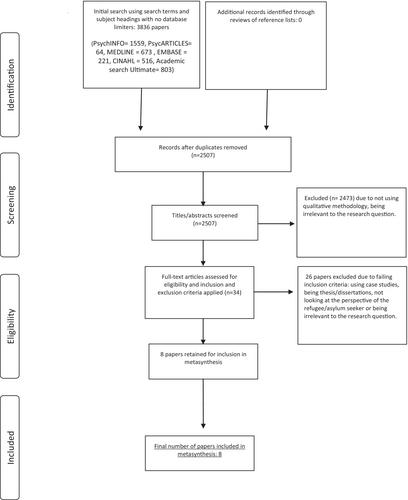The current review aimed to synthesise qualitative literature exploring adult refugees' and asylum seekers' experiences of individual psychological therapy.
A comprehensive systematic search of the following databases led to the identification of eight studies for inclusion in this review: PsycINFO, PsycARTICLES, MEDLINE, EMBASE, CINAHL and Academic Search Ultimate. All selected studies used qualitative methodology to explore refugees' and asylum seekers' experiences of individual psychological therapy. Studies were appraised using an adapted version of the Critical Appraisal Skills Programme (CASP) Tool. The data from these selected studies were then synthesised using a meta-ethnographic approach.
The synthesis of selected studies resulted in the development of five themes; (i) the importance of recognition and validation within therapy, (ii) building a human connection within the therapeutic relationship and the importance of cultural competency, (iii) revisiting trauma, managing difficult emotions from therapy and regaining hope, (iv) the value of practical interventions, (v) ‘one should not wake up the djinns (demons)’—cultural stigma and accessing therapy. These themes illustrated the complexities of working therapeutically with asylum seekers and refugees and the vital role of building trust and safety within the therapeutic relationship prior to engagement in therapeutic work. The results also highlighted varied responses to engaging in trauma work ranging from participants finding the experience transformative to others finding it unhelpful, some participants preferred more practical interventions. Participants' cultural backgrounds and pre-conceptions around therapy impacted on engagement and the therapist's cultural competency was a significant factor in therapeutic engagement.
Working therapeutically with asylum seekers and refugees involves a number of factors for consideration. Forced migrants' socio-political context was seen as central to their experiences of distress and recognition of these factors was imperative for positive therapeutic engagement. This review highlights a number of clinical implications to guide practitioners working therapeutically with this community.


